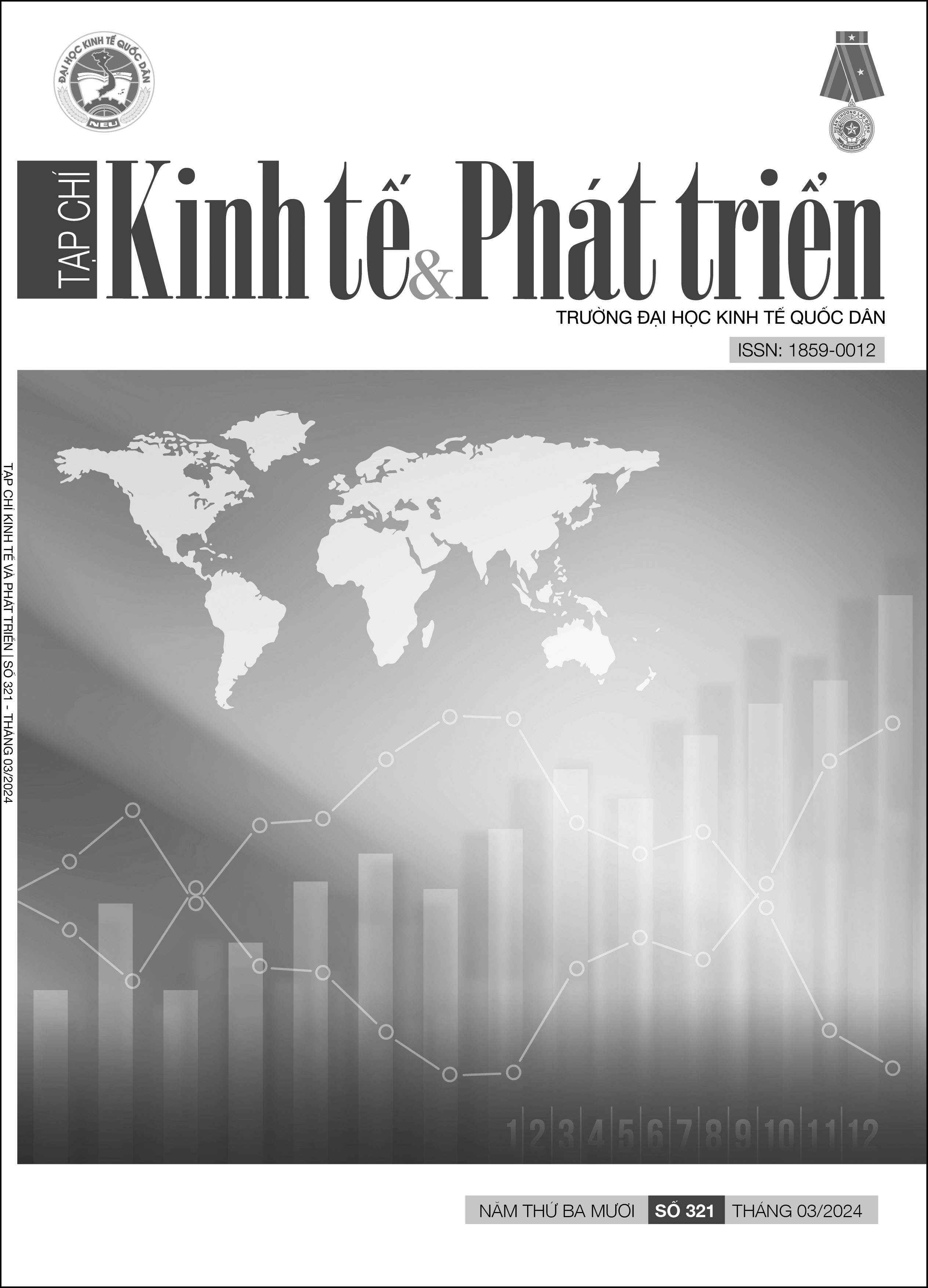Các yếu tố ảnh hưởng đến tính hữu hiệu của kiểm toán nội bộ tại các doanh nghiệp trong thời kỳ chuyển đổi số
DOI:
https://doi.org/10.33301/JED.VI.1481Từ khóa:
Kiểm toán nội bộ, tính hữu hiệu kiểm toán nội bộ, tính độc lập, năng lực của kiểm toán viên nội bộ , ứng dụng công nghệ thông tinTóm tắt
Nghiên cứu này nhằm phân tích ảnh hưởng của năng lực, tính độc lập của kiểm toán viên nội bộ, ứng dụng công nghệ thông tin, sự hỗ trợ từ nhà quản trị và mối quan hệ giữa kiểm toán nội bộ và kiểm toán độc lập đến tính hữu hiệu của kiểm toán nội bộ tại các doanh nghiệp trong thời kỳ chuyển đổi số. Dữ liệu được thu thập thông qua phiếu điều tra gửi đến các cán bộ trong doanh nghiệp cổ phần ở Hà Nội. Phương pháp phân tích mô hình hồi quy tuyến tính được sử dụng để xác định mức độ ảnh hưởng. Kết quả cho thấy, tính độc lập và ứng dụng công nghệ thông tin có ảnh hưởng lớn nhất. Tiếp theo là năng lực của kiểm toán viên và mối quan hệ giữa kiểm toán nội bộ và kiểm toán độc lập; và cuối cùng là sự hỗ trợ từ nhà quản trị. Dựa trên kết quả phân tích, nhóm tác giả đề xuất một số khuyến nghị để nâng cao tính hữu hiệu của kiểm toán nội bộ trong thời kỳ chuyển đổi số tại Việt Nam.
Tài liệu tham khảo
Abu-Azza, W. (2012), Perceived effectiveness of the internal audit function in Libya: A qualitative study using institutional and Marxist theories, University of Southern Queensland, Australia.
Al-Twaijry, A., Brierley, J., & Gwilliam, D. (2004), ‘An examination of the relationship between internal and external audit in the Saudi Arabian corporate sector’, Managerial Auditing Journal, 19(7), 929-944.
Arena, M., & Azzone, G. (2009), ‘Internal Audit Effectiveness: Relevant Drivers of Auditees’ Satisfaction’, International Journal of Auditing, 13, 43-60.
Braun, R. L., & Davis, H. E. (2003), ‘Computer‐assisted audit tools and techniques: analysis and perspectives’, Managerial Auditing Journal, 18(9), 725-731.
Dittenhofer, M. (2001), ‘Internal auditing effectiveness: an expansion of present methods’, Managerial Auditing Journal, 16(8), 443-450.
Drogalas, G., Karagiorgos T. & Arampatzis K. (2015), ‘Factors as-sociated with Internal Audit Effectiveness: Evidence from Greece’, Journal of Accounting and Taxation, 7(7), 113-122.
Hall, J. A. (2015), Accounting information systems, Cengage Learning, USA.
IIA [The Institute of Internal Auditors] (2017), International Standards for The Professional Practice of Internal Auditing, last retrieved on 27 Jan 2024, from <https://www.theiia.org/en/content/guidance/mandatory/standards/international-standards-for-the-professional-practice-of-internal-auditing/>.
Lenz, R., Sarens, G., & Jeppesen, K. K. (2018), ‘In search of a measure of effectiveness for internal audit functions: an institutional perspective’, EDPACS, 58(2), 1-36.
Mihret, D.G., & Woldeyohannis, G.Z. (2008), ‘Value‐added role of internal audit: an Ethiopian case study’, Managerial Auditing Journal, 23(6), 567-595.
Mihret, D.G., & Yismaw, A.W. (2007), ‘Internal audit effectiveness: an Ethiopian public sector case study’, Managerial Auditing Journal, 22(5), 470-484.
Mihret, D.G., James, K., & Mula, M.J. (2010), ‘Antecedents and organizational performance implications of internal audit effectiveness: some propositions and research agenda’, Pacific Accounting Review, 22, 224-252.
Mustapha, M., & Lai, S. J. (2017), ‘Information Technology in Audit Processes: An Empirical Evidence from Malaysian Audit Firms’, International Review of Management and Marketing, 7(2), 53-59.
Sawyer, L. B., Dittenhofer, M. A. & Scheiner, J. H. (2005), Sawyer’s Internal Auditing (5th Edition), The Institute of Internal Auditors, Florida.
Shaikh, J. M. (2005), ‘E‐commerce impact: emerging technology–electronic auditing’, Managerial Auditing Journal, 20(4), 408-421.
Soh, D. S., & Martinov-Bennie, N. (2011), ‘The internal audit function: Perceptions of internal audit roles, effectiveness and evaluation’, Managerial Auditing Journal, 26(7), 605-622.
Van Gansberghe, C. N. (2005)., Internal Audit: Finding its Place in Public Finance Management, International Bank for Reconstruction and Development/The World Bank, Washington, DC.
Vanasco, R. R. (1994), ‘The IIA code of ethics: an international perspective’, Managerial Auditing Journal, 9(1), 12-22.
Wood, D. A. (2004), Increasing Value through Internal and Ex-ternal Auditor Coordination (Prepared for the IIA Research Foundation Esther R. Sawyer Scholarship Award), The IIA Research Foundation, Florida.
Zhao, N., Yen, D. C., & Chang, I. C. (2004), ‘Auditing in the e‐commerce era’, Information Management & Computer Security, 12(5), 389-400.





